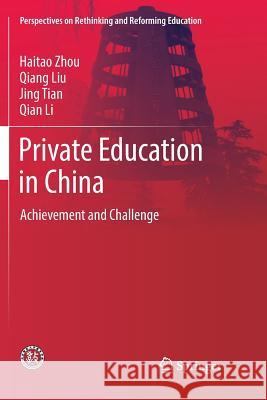Private Education in China: Achievement and Challenge » książka
topmenu
Private Education in China: Achievement and Challenge
ISBN-13: 9789811338380 / Angielski / Miękka / 2019 / 216 str.
Kategorie:
Kategorie BISAC:
Wydawca:
Springer
Seria wydawnicza:
Język:
Angielski
ISBN-13:
9789811338380
Rok wydania:
2019
Dostępne języki:
Numer serii:
000790661
Ilość stron:
216
Waga:
0.34 kg
Wymiary:
23.39 x 15.6 x 1.27
Oprawa:
Miękka
Dodatkowe informacje:
Wydanie ilustrowane











